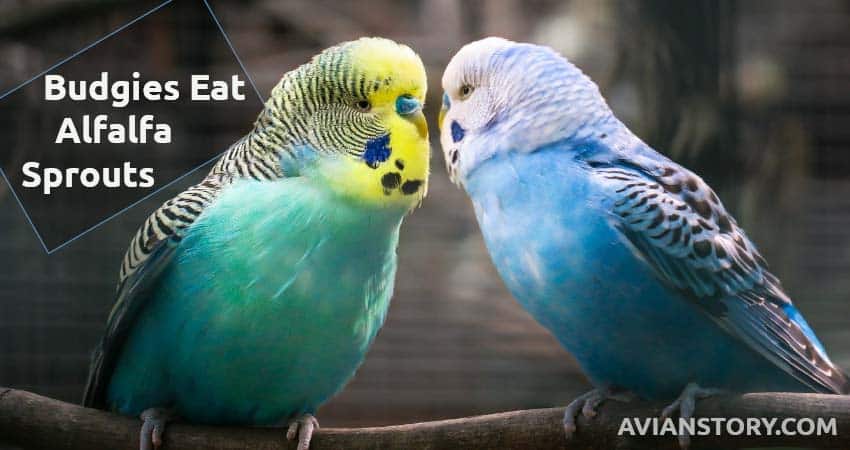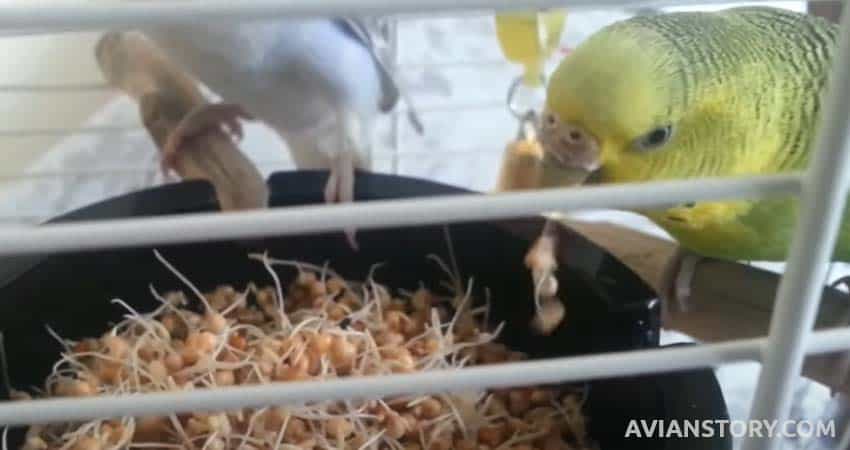Can Budgies Eat Alfalfa Sprouts? – Read Before You Feed
In the domain of avian nutrition, one commonly asked question is: Can budgies eat alfalfa sprouts? Budgerigars, or budgies as they’re fondly known, are small parrots whose dietary needs demand attentive understanding. Simultaneously, alfalfa sprouts, sprouted seeds of the alfalfa plant (Medicago sativa), are a powerhouse of nutrients, offering a panoply of vitamins and minerals.
The safety and nutritional implications of feeding alfalfa sprouts to budgies are crucial subjects, addressed in numerous avian studies and veterinary consultations. However, these explorations are fragmented, scattered in bits and pieces, creating a need for a consolidated guide.
This article aims to provide that comprehensive resource. It addresses whether budgies can consume alfalfa sprouts, explores the sprouts’ nutritional value, discusses the right way to serve them, and finally, notes any potential risks. It is a precise, fact-filled guide, aimed to enhance your understanding and ability to make informed decisions about your budgie’s dietary needs.

What Are Alfalfa Sprouts?
Alfalfa sprouts, derived from the seeds of the alfalfa plant (Medicago sativa), are a widely celebrated health food. Renowned for their nutritional content, they’re low in calories, yet densely packed with essential vitamins and minerals.
Alfalfa sprouts are nutrient-dense, providing a rich source of Vitamins A, C, E, and K, alongside important minerals such as calcium, iron, and magnesium. They also contain protein, dietary fiber, and are low in fat.
Can Budgies Eat Alfalfa Sprouts? Is it Safe?
Originating from the arid regions of Australia, budgies in the wild thrive on a diverse diet. They consume an array of seeds, occasional insects, and native plants, along with their fruits and greens. This variety not only satiates their hunger but also fulfills their complex nutritional needs.
In domestic settings, meeting this dietary diversity can pose challenges. Often, bird owners wonder about the safety and nutritional adequacy of various foods. One such food is alfalfa sprouts. Derived from the germination of alfalfa seeds, these sprouts have gained popularity in human diets, thanks to their rich nutritional profile. But, does this popularity extend to the diet of our feathered friends?
So, can budgies eat alfalfa sprouts? The answer is a resounding yes. Alfalfa sprouts are not only safe for budgies but they can also provide a valuable contribution to their dietary needs. These sprouts contain a range of essential vitamins and minerals, making them a nutrient-dense food choice for budgies.
However, while it’s safe to feed alfalfa sprouts to budgies, they should only form a part of a balanced and diverse diet. In addition, proper preparation is key to ensure safety and enhance digestibility. This means washing the sprouts thoroughly to remove any potential contaminants and serving them in suitable portions to prevent overconsumption.
It’s also important to remember that all budgies are individuals with their own unique tastes. Some might instantly love the addition of alfalfa sprouts to their diet, while others might be more hesitant. Introducing new foods gradually and patiently can help encourage acceptance.
To sum it up, yes, budgies can eat alfalfa sprouts. They are a healthy and beneficial addition to their diet, provided they are prepared appropriately and served as part of a balanced diet. The following sections will delve further into the nutritional benefits of alfalfa sprouts, the correct way to serve them, and any potential risks to be aware of.
Read More: From What Age Do Baby Budgies Eat Seeds?
What Nutritional Value do Alfalfa Sprouts Hold for Budgies?
Alfalfa sprouts, with their wide array of nutrients, offer multiple health benefits to budgies.
The high Vitamin K content in alfalfa sprouts plays a critical role in blood clotting, preventing excessive bleeding. Vitamin A promotes good eye health, while Vitamin E acts as a powerful antioxidant. These sprouts are also high in calcium, vital for strong bones and a healthy nervous system.
In budgies, the benefits of these nutrients are manifold. For instance, Vitamin A helps maintain their eye health and boosts the immune system. Similarly, the antioxidants present in alfalfa sprouts help protect budgies from illness and slow the aging process.
How Should Alfalfa Sprouts be Prepared for Budgies?
Now that we know the benefits of alfalfa sprouts for budgies let’s understand how they should be served.
Cleaning and Prepping Alfalfa Sprouts
Like any other fresh food, alfalfa sprouts should be thoroughly washed before feeding to budgies to remove any pesticide residue or bacteria. After washing, they should be drained well to prevent any fungal growth.
Serving Size and Frequency
A small handful of alfalfa sprouts can be offered to your budgie every other day, mixed in with other fresh fruits and vegetables. Overconsumption can lead to diarrhea, so moderation is key.
How to Feed Alfalfa Sprouts to Budgies

- It’s pretty easy, really. The only concern is the freshness. So, always check the condition before serving.
- Alfalfa sprouts deteriorate very fast, so avoid preserving them in a jar unless needed.
- Eat them while they’re fresh. This goes for both you and your winged family members.
- Top conditioned alfalfa sprouts have cream-colored stems and no smell.
- Take enough sprouts that fill a teaspoon.
- Wash them in clean water.
- Chop them slightly for the budgies to eat easily.
- You can serve them raw or steam them lightly. Budgies love both!
Are There Risks to Feeding Budgies Alfalfa Sprouts?
Despite their nutritional value, it’s worth being mindful of certain risks when feeding alfalfa sprouts to budgies.
As with any food, there can be risks of choking if the sprouts are not properly prepared. Further, overconsumption can lead to diarrhea or nutrient imbalances.
If your budgie exhibits signs of discomfort, digestive distress, or changes in behavior after consuming alfalfa sprouts, it would be prudent to consult a veterinarian.
Health Benefits of Alfalfa Sprouts for Parakeets
Alfalfa sprouts are healthy for you and the budgies. They’re nutritious and bring a positive change in the budgie’s dietary cycle.
- While dried alfalfa seeds are healthy, their sprouting process converts them into an even more nourishing ingredient.
- Alfalfa sprouts release additional nutritional value upon sprouting.
- The soaking process of dry alfalfa seeds alters the proteins, carbohydrates, and fats into more palatable amino acids. It helps budgies to digest food easily.
- Alfalfa sprouts contain minerals, antioxidants, enzymes, and vitamins in higher amounts.
Frequently Asked Questions
What Do I Do With the Leftover Alfalfa Sprouts?
Wash and dry the remaining sprouts. Choose a plastic container and store them in the refrigerator.
What Happens If My Budgies More Than a Tsp. of Alfalfa Sprouts?
The budgies can’t eat more than a tsp unless you’ve surrendered to their adorable chirpy request. They won’t be able to eat other seeds if they fill the stomach with only alfalfa sprouts. It can result in nutritional lacking.
Should I give Alfalfa Sprouts to My Budgies Regularly?
These sprouts are a variation in a daily meal plan for budgies. Therefore, limit them to supplementary snack or treat offered only once or twice a week.
The Bottom Line
So, can budgies eat alfalfa sprouts? Yes, and they love a healthy change in their repeated diet pattern. Alfalfa sprouts can form a bond between you and your budgies. Just remember to give only a tiny portion so they could have space in the stomach to fill in with varied seeds. Lastly, I’m quite content with my discovery since it has saved weekly visits to pet stores which were unnecessary.
Related Posts:
Can Budgies Eat Chia Seeds? [Read Full Article]
Can Budgies Eat Mealworms? [Read Full Article]
Can Budgies Eat Eggs? [Read Full Article]
Can Budgies Eat Bok Choy? [Read Full Article]

